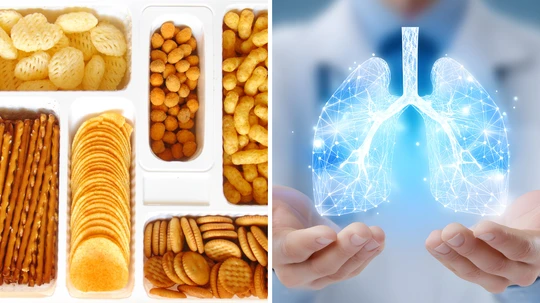A recent study has raised concerns about the long-term impact of ultra-processed foods, suggesting that people who consume a lot of such products may face a higher risk of developing lung cancer.
According to the research, those with the highest intake had a 41% greater likelihood of developing the disease, and what’s striking is that this link stood firm even after accounting for smoking habits and overall diet quality.
The findings come from a long-running analysis involving just over 101,000 adults in the United States, tracked for more than twelve years. During that period, 1,706 participants developed lung cancer, prompting researchers to examine patterns in their diets and lifestyle factors.
What exactly are ultra-processed foods?
Ultra-processed foods, often shortened to UPFs, are items that go far beyond simple cooking or basic processing. They’re typically made using refined ingredients, additives, colourings, stabilisers, and preservatives-with little to no resemblance to their original food sources. Think packaged crisps, sugary drinks, instant noodles, mass-produced baked goods, ready meals, and most “just heat and eat” products.

In many Western diets, UPFs make up more than half of the average daily calorie intake, making them incredibly convenient yet potentially harmful if consumed in large amounts.
What the research found
Published in Thorax, the study suggests a clear association between eating a high amount of UPFs and an increased risk of lung cancer. Crucially, the connection was found across both main subtypes of the disease:
Non-small cell lung cancer (NSCLC): People in the highest UPF intake group were 37% more likely to develop this type.
Small cell lung cancer (SCLC): The risk went up to 44%.
What puts these findings in the spotlight is the fact that the scientists accounted for smoking status, weight, physical activity, diet quality, and a number of other lifestyle factors in their analysis. The association between UPFs and lung cancer was still statistically significant.
Why this matters
While smoking remains the number one risk factor for lung cancer, this study suggests that diet – particularly highly processed foods – may also play an important role.
The authors acknowledged their findings require confirmation through additional large-scale studies across different populations before definitive conclusions can be drawn about causality.
“If causality is established, limiting trends of ultra-processed food intake globally could contribute to reducing the burden of lung cancer,” they concluded.
